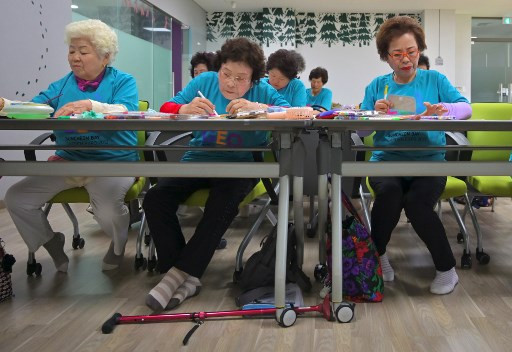Popular Reads
Top Results
Can't find what you're looking for?
View all search resultsPopular Reads
Top Results
Can't find what you're looking for?
View all search resultsIlliterate to author: Ageing South Koreans embrace written word
According to a 2017 study by the National Institute for Lifelong Education, 67.7 percent of South Koreans aged 80 or older were unable to read or write.
Change text size
Gift Premium Articles
to Anyone
 This picture taken on May 14, 2019 shows elderly South Korean women attending a class at a city-run library in Suncheon, 320 kilometres (198 miles) south of Seoul. Hyper-wired South Korea is the world's 11th-largest economy, one of its most technologically advanced countries, and the first to launch a nationwide 5G network. But that is a relatively recent transformation and at the other end of the spectrum, many of its elderly are illiterate. (AFP/Jung Yeon-je)
This picture taken on May 14, 2019 shows elderly South Korean women attending a class at a city-run library in Suncheon, 320 kilometres (198 miles) south of Seoul. Hyper-wired South Korea is the world's 11th-largest economy, one of its most technologically advanced countries, and the first to launch a nationwide 5G network. But that is a relatively recent transformation and at the other end of the spectrum, many of its elderly are illiterate. (AFP/Jung Yeon-je)
H
yper-wired South Korea is the world's 11th-largest economy, one of its most technologically advanced countries, and the first to launch a nationwide 5G network.
But that is a relatively recent transformation and at the other end of the spectrum, many of its elderly are illiterate.
Now some are finally learning to read and write, decades after their contemporaries -- and even becoming published authors.
In the first half of the 20th century, the agricultural south was the poorer half of the already underdeveloped peninsula, and many children never went to school.
According to a 2017 study by the National Institute for Lifelong Education, 67.7 percent of South Koreans aged 80 or older were unable to read or write.
The phenomenon is significantly more pronounced among women -- Korea has been a patriarchal society for centuries and many families kept girls from school even into the mid-20th century, as the country began its rapid industrialization.
"My grandmother used to say a woman with knowledge always ends up rebellious," said Jang Seon-ja, 75, at a library in Suncheon.
"So she forbade me from school," she explained.
It is a marked contrast from the present day, when families put enormous emphasis on education and children -- whether boys or girls -- study for long hours, including extra after-school tuition, in a high-pressure contest for the best possible opportunities.
Read also: 'China's hottest grandpa' is 80... and still going strong
Jang is one of 20 grandmothers in a writing class at the library in Suncheon, 320 kilometers (200 miles) southeast of Seoul.
Sitting in rows with pencils in their hands, the grey-haired women -- aged from 57 to 89 -- summon recollections of their mothers and try to put them into words.
Since the program began three years ago they have co-written a collection of memoirs entitled "We didn't know how to write, but we knew how to live", which conveys stories that bear witness to their country's historical turmoil.
More than 7,000 copies have been sold since it was published in February, library director Na Ok-hyeon, told AFP, who is seeking an English-language publication and has taken three of the authors on a tour of the US.
"I was at first worried whether the translation would capture subtle nuance expressed in Korean," Na said, but added: "Then I saw many with tears in their eyes."
One entry in the book by Kim Young-bun, 80, recalls her family's flight during the Korean War, when she was 11.
"While fleeing, my younger brother died," she wrote. "Seeing nowhere to lay him to rest, I couldn't just leave him so I carried him on my back all day long.
"To this day, I cannot forget him."










